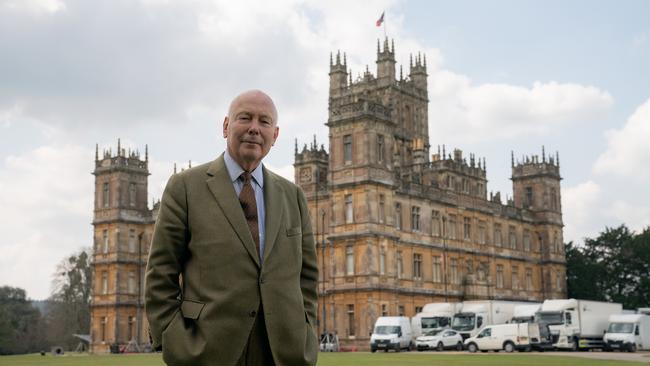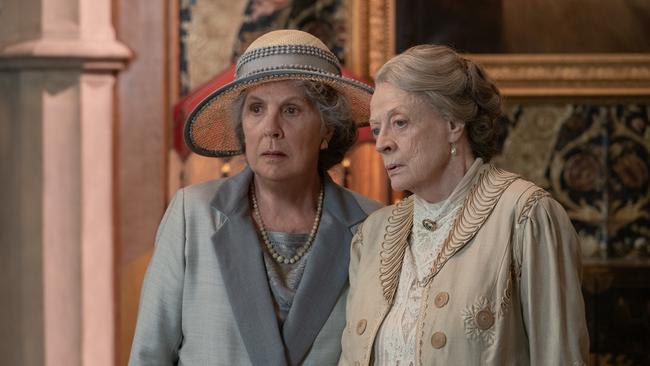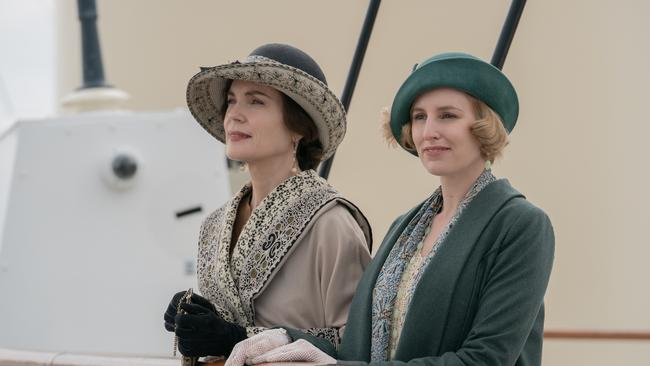Downton Abbey A New Era: Julian Fellowes on the enduring legacy of the period drama
Long before Bridgerton, Julian Fellowes wrote Downton Abbey, and this month, by popular demand, the second spin-off film hits cinemas.

“I’m in the dark, really” Julian Fellowes admits. The writer of dozens of films, television series, musicals and books – the 72-year-old is phenomenally prolific, having penned three novels, an Oscar-winning screenplay for Gosford Park, as well as one of the most popular television series ever made and two Tony-nominated musicals, including Mary Poppins, coming soon to Sydney – is reflecting on the world’s enduring love for Downton Abbey, his most iconic work.
The series debuted some 12 years ago and quickly became beloved on a scale bordering on religious: a global audience of 120 million viewers, the most watched series in the history of American network PBS, 69 Emmy nominations and 15 wins. It made stars of its leads Michelle Dockery and Laura Carmichael, and turned its real-life location, the majestic towers of Highclere Castle, into a sort of Disneyland.
“I never know if something is going to be a success or not,” Fellowes says. “All you can do is make it as good as you can, try and make a show or a film or a TV series that you want to watch and just hope that the audience agrees with you. They don’t always.”
But with Downton they certainly did, following the grand old Crawley family and their ecosystem of pomp and circumstance at the abbey over six seasons, a handful of Christmas specials – which always brought the drama to the festive season; remember when Cousin Matthew died hours after the birth of his only child? – and, now, two ancillary spin-off films. The first premiered in 2019 and made almost $US200m at the global box office, an astonishing number that explains why, at the end of this month, a second will be unleashed into cinemas.

If Fellowes had to take a stab at the reason for his most famous creations’ enduring success it is this: “Decent people doing their best. Upstairs, downstairs, the locals – they were mainly decent men and women doing their best.
“And I think in a time when there was a lot of negativity and violence and horrible people doing their worst, that came as quite a pleasant relief, really.”
So, what are the decent people of Downton up to in this second film, titled Downton Abbey: A New Era? The film opens with a wedding between former family chauffeur turned widowed son-in-law Branson (Allen Leech) and aristocratic love child slash maid Lucy (Tuppence Middleton). The rice has barely hit the parquet floors of Downton’s Great Hall when a telegram arrives bearing delicious news: the Dowager Countess Lady Violet (Dame Maggie Smith, practically perfect in every way) has come into possession of a villa in the south of France from a man with whom she once shared an “enchanting interlude”. But surely Granny isn’t going to accept a palatial spread from a man she barely knew? “Do I look as if I’d turn down a villa in the South of France?” Violet retorts, withering as ever.

And then we’re off to the races. Aged butler Carson (Jim Carter) accompanies a party to the Riviera to help take possession of the pile and gets very hot in his tweed suit. The Downton roof needs repairing and Lady Mary (Dockery) loans out the house as a location for dashing director Jack Barber (Hugh Dancy) to make his next film, much to the consternation of her father Lord Grantham (Hugh Bonneville).
Lady Edith (Carmichael) dabbles in journalism. Mrs Patmore (Lesley Nicol) makes a romantic overture to Mr Mason (Paul Copley) – and no, we don’t know what their first names are, either. The wheel keeps turning, the decent people keep on being decent. More than a decade after you first encountered them all, it’s Downton Abbey exactly as you remembered: gilded, grand and glossy, all drama and no stakes, like a televisual bath for your brain. Everything and everyone is exactly as they seem, which, quite frankly, is a relief.

Fellowes was struck by this cosy familiarity when he went on set early in production in April 2021. “There we all are again, standing in the Great Hall of Highclere, and everyone is back in their clothes and back in their hairstyles, and there is a very nice sense of the club reassembling,” Fellowes reflects. He calls it “Club Downton”, a connection that the cast and crew will always share and its alumnae often pop up in surprising places. “My son, his first job in films was making coffee and driving cars on the set of Cinderella,” Fellowes shares. “And there was Lily (James) and there was Sophie (McShera, who plays kitchenmaid Daisy), and they were all screaming because it was like ‘Club Downton’ transposed.”
James famously joined Downton in season three as Lady Rose, the sweet but incredibly naughty niece who kept running orf from Downton to dance in nightclubs with the other bright young things. Fellowes recalls casting director Jill Trevellick presenting him a tape of James, fresh out of drama school, with the exhortation that they simply had to hire her. “I remember one of the other producers said, ‘Well, what’s the part?’” Fellowes chuckles. “I said, ‘Never mind that! We’ll make up the part, we just want the girl!’”
Fellowes says it’s a thrill to feel Downton played its role in launching James into the realms of movie stardom. Has he seen Pam & Tommy, the raunchy miniseries starring James as Pamela Anderson? “I haven’t watched it,” he tells The Australian. “My son watched it, and he thought she was very good in it.”
He watches big, blockbuster American network television: Mad Men, The West Wing and The Good Wife. “Actually, I was a big fan of Christine Baranski in The Good Wife, and now she’s in The Gilded Age, which is great,” Fellowes shares.
Fellowes is undoubtedly at the vanguard of our continued obsession with the costume drama. Exactly 20 years ago, he won an Oscar for Gosford Park, having penned a script that cleaved through 1930s upper crust society like a carving knife through a stick of butter.
The cast for the film remains one of the best ever to be committed to celluloid – Michael Gambon, Kristin Scott Thomas, Clive Owen, Richard E Grant, Emily Watson, Kelly McDonald, Jeremy Northam, Bob Balaban, Charles Dancy, Stephen Fry, Helen Mirren, Eileen Atkins and the great Maggie Smith – but even after 20 years, it’s Fellowes’ lines that remain the movie’s most enduring legacy. (“Bought marmalade. Oh dear, I call that very feeble.”)

Downton Abbey was initially intended as a spin-off from Gosford Park, but then Fellowes switched tacks and moved the action forward a few decades to the early 1910s, which proved to be a fortuitous dramatic shift, affording him the opportunity to graft an entire season off the back of World War I. Fellowes has also written scripts for The Young Victoria, Belgravia and The Gilded Age, this year’s stealth television sensation, a tale of old money in contention with the new against a backdrop of the ever-changing late 19th century New York. More than eight million people watched the season finale, in which the dramatic stakes amounted to whether or not Lady Astor would attend a ball thrown by the upstart Bertha Russell (Carrie Coon). Make no mistake, it was spectacular.
In 2009, when Fellowes was writing Downton for television, “it was thought that the period drama was dead and there was no real market for it and it was finished,” he reflects. The naysayers were wrong, however, and the period drama rebounded, first with Downton and now with productions including Netflix’s smash hit Bridgerton and The Gilded Age. The writer believes that the period drama will never quite go out of fashion, even if they do require the occasional oiling of the joints every now and then.
(Bridgerton’s use of colourblind casting is one such example of a much-needed airing out of the once-stuffy genre.) For one thing, Fellowes says that there is no better place to write interesting female characters than in a period piece.
“Our generation didn’t invent clever women,” he declares. You can find them in every era, especially the turn of the century milieu in which Downton sets its scene. “You get this immediate tension between a clever, ambitious woman and what she is allowed to do by the society in which she is operating,” muses Fellowes.
It makes for great and watchable entertainment, and probably explains why Fellowes’ series are, to a one, vastly more interested in their female characters than their male ones. Like Coon’s Bertha Russell, whom Fellowes suggests would be the American ambassador to Paris or running a major company if she was in a contemporary series – anything that would get her into “a position of power”.
Or Lady Mary, Downton’s coolly compelling heiress protagonist, who could always be relied upon, in both the small and big screen iterations, for two things: being roped into some sort of elaborate, plot-advancing scheme, and finding herself in the arms of the most gorgeous men. (Her lovers have been played by a roster of Britain’s finest, from Theo James to Dan Stevens, Iain Glen and Matthew Goode. “Lucky me,” as Mary puts it in the new film.) Or, indeed, Smith’s Lady Violet, the dowager countess comeback machine, who became the steadfast fan favourite despite Smith revealing that she never watched a single episode, nor, indeed, did she intend to. “What is a weekend?” was Lady Violet’s most cherished retort, though we are partial to the following, about a group of jazz musicians: “Do you think any of them know what the others are playing?”
“Much like everyone else, I very much enjoyed Maggie’s performance in Downton,” Fellowes says. “It was her first and probably only ongoing television show. I don’t know if she’d be all that keen to do another.” Both Downton films are undeniably odes to Smith; this new, second film in ways that are profoundly moving. Downton’s secret is that for all of its sudsy tendencies, it is peopled by some of the UK’s best actors. (This is The Crown’s secret, too.)
Smith is every bit the actor she has always been, even at 87, uniquely equipped to drive home the second film’s message, which is ultimately about learning how to move on. “I don’t think (people) mellow, exactly, but there are moments where it’s important to say what you feel and what you mean, and to make your feelings clear,” Fellowes shares. “I think that is what we’re dealing with in the second film for her. She knows what’s coming, and it’s important for her to speak the truth.”
Opportunities for indelible characters and performances like the one from Smith will ensure that the period drama will always endure; Baranski is giving a similar turn on The Gilded Age. “People enjoy having a relationship with these characters and watching their lives develop,” Fellowes says. But also, he adds, “there are the clothes and the setting and all of that, and if people are prepared to get behind that, and spend the money then I think you can make a very entertaining show”.
And someone does have to pay for it: each episode of Downton cost in the vicinity of $US1m, and by the end the series looked so expensive you could feel an accountant’s blood pressure rising. But someone always does. HBO has commissioned a second season of The Gilded Age, which will no doubt feature as many profiterole-light storylines as its first, such as the French chef unceremoniously revealed as an impostor from Wichita, Kansas, or the warring butler factions in the houses on the corner of East 61st and Fifth Ave.
Even Downton, which Fellowes was certain was finished when the series took its final prime time bow in 2015, continues on, our appetite for more stories about the Crawleys seemingly insatiable that you never know when another one will crop up. “When I finished series five, I thought it was the end. Series six I knew was the end,” Fellowes admits. “One movie, now another. Each time it comes as a very pleasant surprise.”
Downton Abbey: A New Era is in cinemas on April 28.


To join the conversation, please log in. Don't have an account? Register
Join the conversation, you are commenting as Logout